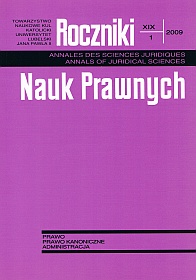Future of Canon Law in Poland
Abstract
Canon Law, understood as a systematised body of laws governed by the Church, plays a vital role in the life of this Church. Springing from its “womb”, Canon Law is meant to build community and it is organically bound with the inner life of the Church. Therefore it serves the work of salvation.
Thus perceived, Canon Law is the subject of canon studies, a field of science that belongs both to theological studies (due to its subject) and legal studies (due to its method). If one wants to talk about the future of Canon Law, one has to ask about the future of canon studies, taking into account its three basic tasks: education, production of research personnel and conducting scientific research.
As far as the teaching of Canon Law is concerned, there are three academic institutions that offer Canon Law study (The John Paul II Catholic University of Lublin, Cardinal Stefan Wyszynski University in Warsaw and The Pontifical Academy of Theology in Cracow). Apart from these, classes in Canon Law are held by various theological departments, higher seminaries and in diocesan religious institutes.
Only the Catholic University and Stefan Wyszynski University train scientific workers, namely doctors and university professors, the number of whom has been steadily increasing recently, while the number of full professors is not growing too fast.
In the area of academic science and research, there is a systematic growth in the amount of publications, also monographs, yet still too few Polish authors publish in foreign languages. It is encouraging, though, that many symposiums and conferences are held systematically.
Copyright (c) 2009 Roczniki Nauk Prawnych

This work is licensed under a Creative Commons Attribution-NonCommercial-NoDerivatives 4.0 International License.


